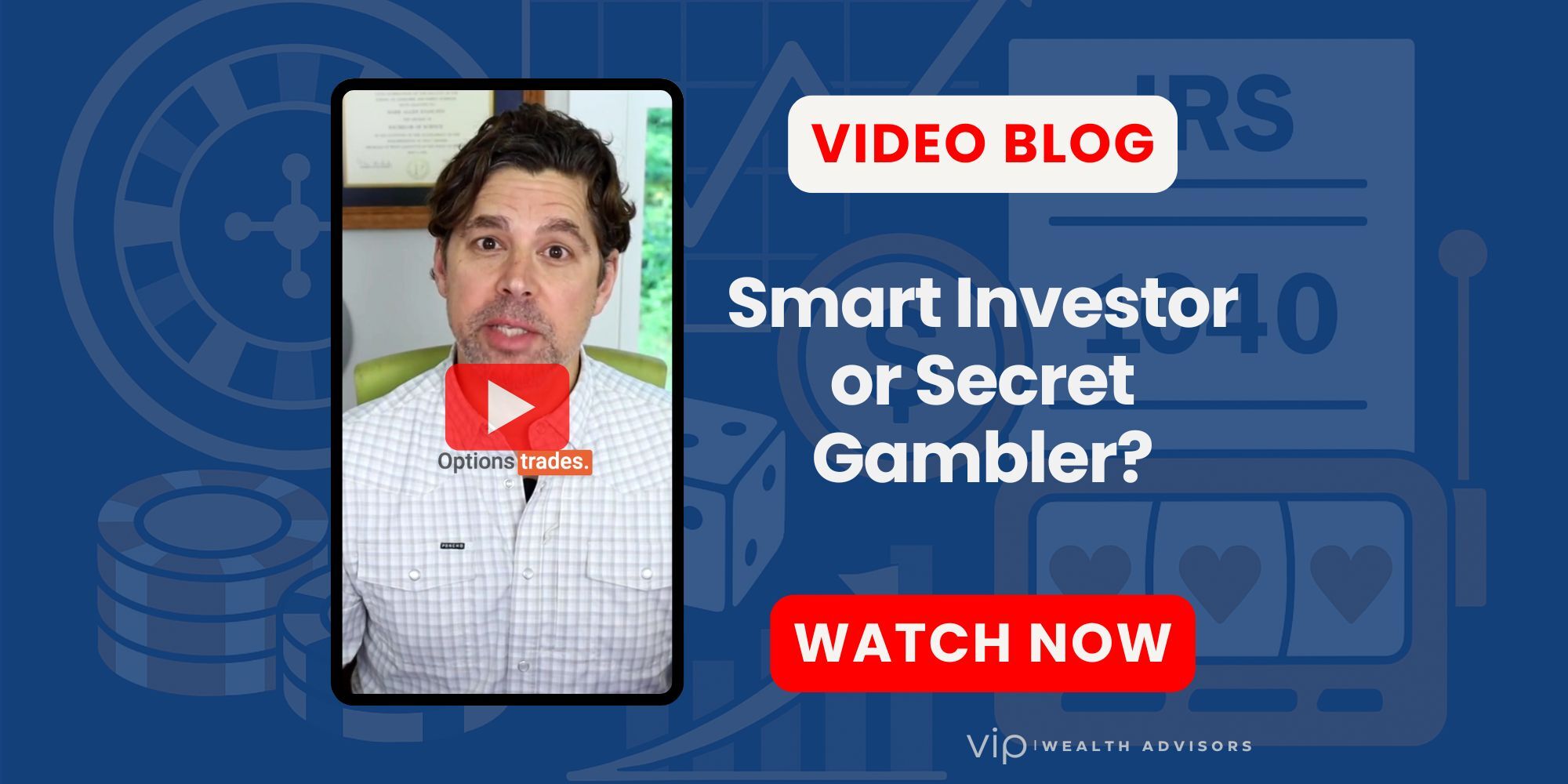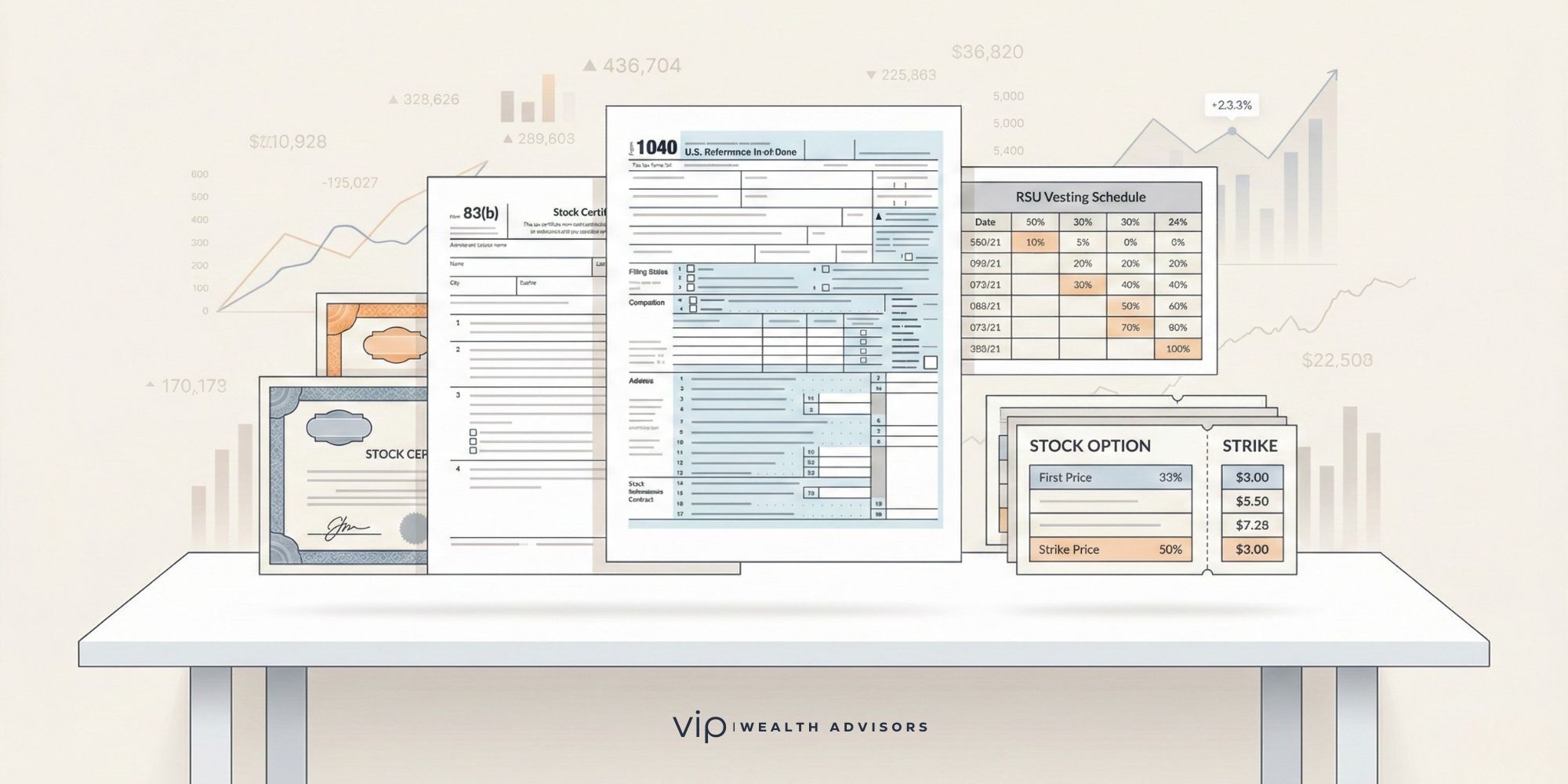The Economics of Gambling: Why High Earners Mistake Risk for Strategy
Picture this: You're in Vegas, watching a guy drop $1,000 hands at the blackjack table with the cool detachment of someone who sees the world in probabilities. But here’s the kicker: you’ve seen that same energy in a San Francisco boardroom, in a Slack message about a startup investment, or the late-night ping from a client asking if they should go all-in on Tesla calls.
Wealthy, educated, disciplined professionals - gambling.
At VIP Wealth Advisors, we don’t moralize. But we do measure. And when you run the math, gambling in its many forms is a losing game dressed in adrenaline and wrapped in illusion.
This isn’t just a Public Service Announcement about Vegas. This is about the economic truth behind behavior we see every day: intelligent people mistaking randomness for strategy, thrill for opportunity, and speculation for wealth-building.
The Economics: When the House Has the Edge
Gambling, at its core, is negative expected value. It’s a game built to profit the operator, not the participant. The math isn’t ambiguous:
- Blackjack (perfect strategy): ~49% win rate
- Slot machines: Payouts range from 85% to 95% (meaning the house keeps 5% to 15%)
- Roulette: 5.26% house edge on American wheels
Compare that with the long-term performance of the S&P 500, which has historically returned 7–10% annually after inflation.
In gambling, you start behind, and the longer you play, the more certain your loss becomes. In investing, you start neutral or even slightly ahead if you use a diversified strategy, and time is on your side.
The house always wins unless you become the house.
So Why Do Smart People Gamble?
Short answer? Brains are wired for dopamine, not discipline.
- Near-miss phenomenon: Almost winning feels like winning. But it isn’t.
- Illusion of control: We believe our skill or intelligence can influence luck to our advantage.
- Confirmation bias: We tend to remember the wins and overlook the 99 losses.
- Identity: Risk-taking can feel like a performance of boldness, confidence, even masculinity.
And then there’s the boredom.
When you’ve optimized your career, automated your finances, and achieved early success, chasing thrill can feel like progress. For some, a well-balanced portfolio feels too tame. So they gamble, but they call it "angel investing," "options trading," or "swinging for the fences."
The Hidden Forms of Gambling We See Every Day
Let’s expand the definition:
- Startup investing without diligence
- Crypto speculation with no exit plan
- Meme stocks fueled by Reddit hype
- Leveraged real estate with no liquidity plan
- Exercising stock options without understanding AMT
Not all risk is gambling. But all gambling is a risk. If there's no plan, no margin of safety, and no ability to repeat the decision with discipline? It's a gamble.
The Tax Angle: Uncle Sam Isn’t Playing Games
If you thought Vegas was ruthless, meet the IRS.
Historically, gambling has always had a punishing tax profile. But as of July 4, 2025, the "American Growth & Prosperity Act" made things even worse for anyone looking to outplay the odds.
Here’s the updated tax reality every gambler—casual or professional—needs to understand.
Gambling Winnings Are Taxed Like Ordinary Income
- All gambling winnings, whether from poker, sports betting, slots, or fantasy leagues, are taxed at your marginal income rate.
- Winnings over certain thresholds trigger Form W-2G reporting directly to the IRS.
- Fail to report it? Don’t worry, they already know.
But Losses? That’s Where It Gets Brutal
Under the old rules, you could deduct gambling losses dollar-for-dollar against winnings, but only if you itemized and only up to the amount of winnings. There was no carryforward, and no way to offset other types of income.
But beginning January 1, 2026, the rules get even tighter.
New Rule: You Can Only Deduct Up to 90% of Your Gambling Losses
That’s right—thanks to a quiet provision buried in the 2025 tax bill, gambling losses are now capped at 90% of what you actually lost, up to the amount of your winnings.
Let’s break that down with real-world math:
Example: Break-Even Isn’t Break-Even Anymore
- You win $10,000 playing blackjack
- You lose $10,000 at poker
- Under old law, you'd break even: $10K - $10K = $0 taxable income
- Under the new law? Only 90% of your losses ($9,000) are deductible
- Result: You’re taxed on $1,000 of "phantom income"—money you never actually made
Other Critical Tax Implications
- No carryforward: Unused gambling losses are forfeited forever. This is unlike capital losses, which can offset gains indefinitely.
- Higher audit risk: With expanded W-2G reporting thresholds and better IRS data integration, gambling activity is increasingly visible and scrutinized.
- No cross-offsets: Gambling losses can’t offset wages, business income, or investment gains—just gambling winnings.
- New compliance rules: Some platforms are now required to report wins/losses more frequently, meaning real-time IRS tracking is here.
Bottom Line
- Casual bettors now face surprise tax bills even when they "broke even."
- Professionals are taxed on “phantom income” and denied full relief on real losses.
- The IRS has turned gambling into a revenue generator, not just for the casinos, but for the federal government.
If you're going to take financial risks, make sure they're in arenas where the math, tax code, and probability are on your side.
When Clients Confuse Speculation with Strategy
Let’s look at a few hypothetical profiles:
Client A: A tech executive who came into $1.2M from early-stage equity and decided to invest $400k into a friend’s crypto project without proper review. The project collapsed.
Client B: A business owner who treated options trading like a side hustle, unintentionally racking up short-term capital gains and triggering wash-sale disallowances.
Client C: A poker hobbyist who didn’t report their winnings and faced an IRS audit, resulting in penalties and a time-intensive resolution process.
These aren’t stories about recklessness. They’re reminders that even capable and intelligent people can take unstructured risks without realizing the long-term consequences.
Risk Isn’t the Problem. Unpriced Risk Is.
Here’s what we believe:
- Wealth is built on repeatable actions, not home runs.
- Real investing is about asymmetric upside with known downside.
- You can take risks, but price it, size it, and integrate it.
Want to swing for the fences with a small percentage of your net worth? We’ll help you build a "risk bucket" in your plan. Just don’t call it strategy if it doesn’t have parameters.
When Gambling Is Entertainment, Not Strategy
We’re not anti-fun. We just don’t confuse it with financial progress.
If playing poker, sports betting, or betting on a startup you believe in brings you joy, that’s okay. But it belongs in your "play" budget, not your wealth plan. Just like travel or dining out, these are lifestyle choices, not wealth engines.
And if it stops being fun? That’s a red flag.
The VIP Lens: Replace Gambling With Intention
Our clients don’t need luck. They need:
- Strategic planning across tax, equity, and investments
- Access to vetted private opportunities, not Hail Mary pitches
- Clear boundaries between play capital and core wealth
- A structure that supports long-term peace of mind
You want freedom, autonomy, the ability to make bold moves without fear. That doesn’t come from doubling your money overnight. It comes from doing the boring things right, repeatedly.
Gambling might give you a story. Planning gives you results.
Final Word: Stop Playing. Start Building.
There’s a reason the casinos are lavish and the hedge funds are quiet. One is built on illusion. The other on math.
We’ve helped clients win big. But never by chasing easy money. Real wealth isn’t lucky. It’s intentional.
If you’re ready to stop gambling with your future and start designing it with purpose, book a free discovery call today.
View More Articles by Topic
- Taxes (81)
- Financial Planning (46)
- Equity Compensation (38)
- Investments (30)
- RSU (23)
- Tax Policy & Legislation (19)
- Business Owner Planning (17)
- Incentive Stock Options (16)
- Retirement (16)
- Psychology of Money (15)
- Alternative Investments (13)
- AMT (9)
- Pre-IPO Planning (9)
- Real Estate (9)
- Estate Planning (8)
- Fiduciary Standard (8)
- Crypto (6)
- NSOs (6)
- The Boring Investment Strategy (6)
- Capital Gains Tax (5)
- Private Investments (5)
- QSBS (5)
- Market Insights (4)
- Post-IPO Tax Strategy (4)
- 401(k) Strategy (3)
- Market Timing (3)
- Q&A (3)
- Stock Market (3)
- Venture Capital (3)
- Altruist (2)
- Charitable Giving (2)
- ETF Taxes (2)
- IRA Strategy (2)
- International Financial Strategies (2)
- Irrevocable Trust (2)
- Legacy Wealth (2)
- Video (2)
- AUM vs Flat Fee (1)
- Atlanta (1)
- Book Review (1)
- Carried Interest Planning (1)
- Depreciation & Deductions (1)
- Education Planning (1)
- Energy Markets (1)
- Precious Metals (1)
- QTIP Trust (1)
- Revocable Trust (1)
- Risk Management (1)
- Schwab (1)
- Solo 401k (1)








